Fleurs du Mal Magazine


Or see the index
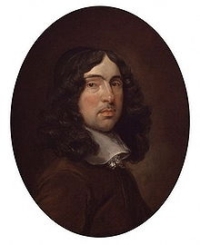
Andrew Marvel
(1621-1678)
To His Coy Mistress
Had we but World enough, and Time,
This coyness Lady were no crime.
We would sit down, and think which way
To walk, and pass our long Loves Day.
Thou by the Indian Ganges side
Should’st Rubies find: I by the tide
Of Humber would complain. I would
Love you ten years before the Flood:
And you should if you please refuse
Till the conversion of the Jews.
My vegetable love should grow
Vaster than Empires, and more slow.
An hundred years should grow to praise
Thine Eyes, and on thy Forehead Gaze.
Two hundred to adore each Breast:
But thirty thousand to the rest.
An Age at least to every part,
And the last Age should show your Heart.
For Lady you deserve this State;
Nor would I love at lower rate.
But at my back I alwaies hear
Times winged Charriot hurrying near:
And yonder all before us lye
Desarts of vast Eternity.
Thy Beauty shall no more be found;
Nor, in thy marble Vault, shall sound
My echoing Song: then Worms shall try
That long preserv’d Virginity:
And you quaint Honour turns to dust;
And into ashes all my Lust.
The grave’s a fine and private place,
But none I think do there embrace.
Now therefore, while the youthful hew
Sits on thy skin like morning [dew],
And while thy willing Soul transpires
At every pore with instant Fires,
Now let us sport us while we may;
And now, like am’rous birds of prey,
Rather at once our Time devour,
Than languish in his slow-chapt pow’r.
Let us roll all our Strength, and all
Our sweetness, up into one Ball:
And tear our Pleasures with rough strife,
Through the Iron gates of Life.
Thus, though we cannot make our Sun
Stand still, yet we will make him run.
Andrew Marvel poetry
fleursdumal.nl magazine
More in: Archive M-N, CLASSIC POETRY
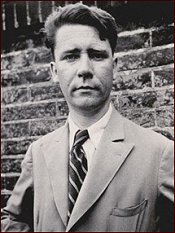
Hendrik Marsman
(1899-1940)
De zee
Wie schrijft, schrijv’ in den geest van deze zee
of schrijve niet; hier ligt het maansteenrif
dat stand houdt als de vloed ons overvalt
en de cultuur gelijk Atlantis zinkt;
hier alleen scheert de wiekslag van het licht
de kim van het drievoudig continent
dat aan ons lied den blanken weerschijn schenkt
van zacht ivoor en koolzwart ebbenhout,
en in den dronk den geur der rozen mengt
met de extasen van den wingerdrank.
Hier golft de nacht van ‘t dionysisch schip
dat van de Zuilen naar den Hellespont
en van Damascus naar den Etna zwierf;
hier de fontein die naar het zenith sprong
en regenbogen naar de kusten wierp
van de moskee, de tempel en het kruis.
Hier heeft het hart de hoge stem gehoord
waardoor Odysseus zich bekoren liet
en ‘t woord dat Solon te Athene sprak;
en in de branding dezer kusten brak
de trots van Rome en van Babylon.
Zolang de europese wereld leeft
en, bloedend, droomt den roekelozen droom
waarin het kruishout als een wijnstok rankt,
ruist hier de bron, zweeft boven déze zee
het lichten van den creatieven geest.
Hendrik Marsman poetry
fleursdumal.nl magazine
More in: Archive M-N, Marsman, Hendrik

Hendrik Marsman
(1899-1940)
Herinnering aan Holland
Denkend aan Holland
zie ik brede rivieren
traag door oneindig
laagland gaan,
rijen ondenkbaar
ijle populieren
als hoge pluimen
aan den einder staan;
en in de geweldige
ruimte verzonken
de boerderijen
verspreid door het land,
boomgroepen, dorpen,
geknotte torens,
kerken en olmen
in een groots verband;
de lucht hangt er laag
en de zon wordt er langzaam
in grijze veelkleurige
dampen gesmoord,
en in alle gewesten
wordt de stem van het water
met zijn eeuwige rampen
gevreesd en gehoord.
Hendrik Marsman poetry
fleursdumal.nl magazine
More in: Archive M-N, Marsman, Hendrik
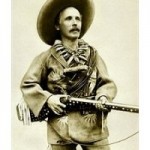
Karl May
(1842-1912)
Trost
Horch, klopfte es nicht an die Pforte?
Wer naht, von Himmelsduft umrauscht?
Woher des Trostes süße Worte,
Auf die mein Herz voll Andacht lauscht?
Wer neigt, wenn alle Sterne sanken,
Mit mildem Licht und stiller Huld
Sich zu dem Staub- und Erdenkranken?
Es ist der Engel der Geduld.
»O laß den Gram nicht mächtig werden,
Du tiefbetrübtes Menschenkind!
Wiß’, daß die Leiden dieser Erden
Des Himmels beste Gaben sind
Und daß, wenn Sorgen Dich umwogen
Und Dich umhüllt des Zweifels Nacht,
Dort an dem glanzumfloss’nen Bogen
Ein treues Vaterauge wacht!«
»O laß Dir nicht zu Herzen steigen
Die langverhaltne Thränenfluth!
Wiß, daß grad in den schmerzensreichen
Geschicken tiefe Weisheit ruht,
Und daß, wenn sonst Dir Nichts verbliebe,
Die Hoffnung doch Dir immer lacht,
Da über Dich in ew’ger Liebe
Ein treues Vaterauge wacht!«
»O wolle nie Dich einsam fühlen!
Obgleich kein Aug’ sie wandeln sah,
Die sorgenheiße Stirn zu kühlen
Sind Himmelsboten immer da.
Wer gern dem eignen Herzen glaubte,
Der kennt des Pulses heilige Macht.
Drum wiß, das über Deinem Haupte
Ein treues Vaterauge wacht!«
»Drum füge Dich in Gottes Walten
Und trag Dein Leid getrost und still.
Es muß im Dunkel sich gestalten,
Was er zum Lichte führen will.
Dann bringt der Glaube reichen Segen,
Ob ihn der Zweifler auch verlacht,
Daß über allen Deinen Wegen
Ein treues Vaterauge wacht!«
Karl May poetry
fleursdumal.nl magazine
More in: Archive M-N, Karl May
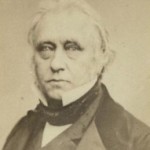
Thomas Babington Macaulay
(1800-1859)
Dies Irae
On that great, that awful day,
This vain world shall pass away.
Thus the sibyl sang of old,
Thus hath holy David told.
There shall be a deadly fear
When the Avenger shall appear,
And unveiled before his eye
All the works of man shall lie.
Hark! to the great trumpet’s tones
Pealing o’er the place of bones:
Hark! it waketh from their bed
All the nations of the dead,–
In a countless throng to meet,
At the eternal judgment seat.
Nature sickens with dismay,
Death may not retain its prey;
And before the Maker stand
All the creatures of his hand.
The great book shall be unfurled,
Whereby God shall judge the world;
What was distant shall be near,
What was hidden shall be clear.
To what shelter shall I fly?
To what guardian shall I cry?
Oh, in that destroying hour,
Source of goodness, Source of power,
Show thou, of thine own free grace,
Help unto a helpless race.
Though I plead not at thy throne
Aught that I for thee have done,
Do not thou unmindful be,
Of what thou hast borne for me:
Of the wandering, of the scorn,
Of the scourge, and of the thorn.
Jesus, hast thou borne the pain,
And hath all been borne in vain?
Shall thy vengeance smite the head
For whose ransom thou hast bled?
Thou, whose dying blessing gave
Glory to a guilty slave:
Thou, who from the crew unclean
Didst release the Magdalene:
Shall not mercy vast and free,
Evermore be found in thee?
Father, turn on me thine eyes,
See my blushes, hear my cries;
Faint though be the cries I make,
Save me for thy mercy’s sake,
From the worm, and from the fire,
From the torments of thine ire.
Fold me with the sheep that stand
Pure and safe at thy right hand.
Hear thy guilty child implore thee,
Rolling in the dust before thee.
Oh the horrors of that day!
When this frame of sinful clay,
Starting from its burial place,
Must behold thee face to face.
Hear and pity, hear and aid,
Spare the creatures thou hast made.
Mercy, mercy, save, forgive,
Oh, who shall look on thee and live?
Thomas Babington Macaulay poetry
fleursdumal.nl magazine
More in: Archive M-N, CLASSIC POETRY

Anthony Munday
(1553-1633)
I Serve a Mistress
I serve a mistress whiter than snow,
Straighter than cedar, brighter than the glass,
Finer in trip and swifter than the roe,
More pleasant than the field of flowering grass;
More gladsome to my withering joys that fade,
Than winter’s sun or summer’s cooling shade.
Sweeter than swelling grape of ripest wine,
Softer than feathers of the fairest swan,
Smoother than jet, more stately than the pine,
Fresher than poplar, smaller than my span,
Clearer than beauty’s fiery pointed beam,
Or icy crust of crystal’s frozen stream.
Yet is she curster than the bear by kind,
And harder hearted than the agèd oak,
More glib than oil, more fickle than the wind,
Stiffer than steel, no sooner bent but broke.
Lo! thus my service is a lasting sore;
Yet will I serve, although I die therefore.
Anthony Munday poetry
fleursdumal.nl magazine
More in: Archive M-N, CLASSIC POETRY
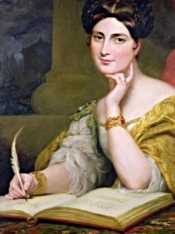
Caroline Elizabeth Sarah Norton
(Lady Stirling-Maxwell)
(1808-1877)
I Do Not Love Thee!
I do not love thee! – no! I do not love thee!
And yet when thou art absent I am sad;
And envy even the bright blue sky above thee,
Whose quiet stars may see thee and be glad.
I do not love thee! – yet, I know not why,
Whate’er thou dost seems still well done, to me:
And often in my solitude I sigh
That those I do love are not more like thee!
I do not love thee! – yet when thou art gone,
I hate the sound (though those who speak be dear)
Which breaks the lingering echo of the tone
Thy voice of music leaves upon my ear.
I do not love thee! – yet thy speaking eyes,
With their deep, bright, and most expressive blue,
Between me and the midnight heaven arise,
Oftener than any eyes I ever knew.
I do not love thee! yet, alas!
Others will scarcely trust my candid heart;
And oft I catch them smiling as they pass,
Because they see me gazing where thou art.
Caroline Elizabeth Sarah Norton poetry
fleursdumal.nl magazine
More in: Archive M-N, CLASSIC POETRY
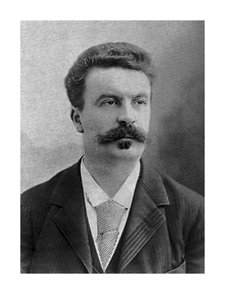
Guy de Maupassant
(1850-1893)
LE DIEU CRÉATEUR
La nature, d’essai en essai, allant du plus imparfait au plus parfait, arrive à cette dernière création qui mit pour la première fois l’homme sur la terre.
Pourquoi le jour ne viendrait-il pas où notre race sera effacée, où nos ossements déterrés ne sembleront aux espèces vivantes que des ébauches grossières d’une nature qui s’essaie ?
Jouffroy
Dieu, cet être inconnu dont nul n’a vu la face,
Roi qui commande aux rois et règne dans l’espace,
Las d’être toujours seul, lui dont l’infinité
De l’univers sans bornes emplit l’immensité,
Et d’embrasser toujours, seul, par sa plénitude
De l’espace et des temps la sombre solitude,
De rester toujours tel qu’il a toujours été,
Solitaire et puissant durant l’Éternité,
Portant de sa grandeur la marque indélébile,
D’être le seul pour qui le temps soit immobile,
Pour qui tout le passé reste sans souvenir
Et qui n’attend rien de l’immense avenir ;
Qui de la nuit des temps perce l’ombre profonde ;
Pour qui tout soit égal, pour qui tout se confonde
Dans l’éternel ennui d’un éternel présent,
Solitaire et puissant et pourtant impuissant
A changer son destin dont il n’est pas le maître,
Le grand Dieu qui peut tout ne peut pas ne pas être !
Et ce Dieu souverain, fatigué de son sort,
Peut-être en sa grandeur a désiré la mort !
Une éternité passe, et toujours solitaire
Il voit l’éternité se dresser tout entière !
Enfin las de rester seul avec son ennui
Des astres au front d’or il a peuplé la nuit ;
Dans l’espace flottait comme un chaos immonde ;
De la matière impure il a formé le monde.
Depuis longtemps la masse aride errait toujours,
Comme Dieu solitaire et dans la nuit sans jours ;
Mais les astres brillaient et quelquefois dans l’ombre
Un beau rayon de feu courant par la nuit sombre
Éclairait tout à coup le sol inhabité
Cachant comme un proscrit sa triste nudité !
Soudain levant son bras, le grand Dieu solitaire
Alluma le soleil et regarda la terre !
Alors tout s’anima sous l’ardeur de ses feux,
L’arbre géant tordit ses membres monstrueux,
La végétation monta, puissante, énorme,
Premier essai de Dieu, production informe
Et le globe roulant ses prés, ses grands bois verts,
Tournait silencieux dans le vaste univers,
Balançant dans le ciel sur sa tête parée
Et ses hautes forêts et sa mer azurée.
Pourtant Dieu le trouva triste et nu comme lui.
Rêveur, il y jeta le feu qui gronde et luit ;
Alors tout disparut, englouti sous la flamme.
Mais quand il renaquit, le monde avait une âme.
C’était la vie ardente, aux souffles tout-puissants,
Mais confuse et jetée en des êtres pesants
Faits de vie et de sève et de chair et d’argile
Comme l’oeuvre incomplet d’un artiste inhabile.
Monstres hideux sortant de gouffres inconnus
Qui traînaient au soleil leurs corps mous et charnus.
Se penchant de nouveau, Dieu regarda la terre,
Elle tournait toujours sauvage et solitaire.
Tout paraissait tranquille et calme ; mais parfois
Quelque bête en hurlant passait dans les grands bois,
D’arbres déracinés laissant un long sillage,
Et son dos monstrueux soulevait le feuillage ;
Elle allait mugissante et traînant lentement
Son corps inerte et lourd sous le bleu firmament ;
Et sa voix bondissait par l’écho répétée
Jusqu’au trône de Dieu dans l’espace emportée ;
Et puis tout se taisait et l’on ne voyait plus
Que le flot verdoyant des grands arbres touffus.
Mais toujours mécontent, ce Dieu lança sa foudre,
Alors tout disparut brûlé, réduit en poudre.
Puis la sève revint, ainsi qu’un sang vermeil
Dans les veines du sol qu’échauffait le soleil,
L’herbe verte et les fleurs cachaient la terre nue ;
L’arbre ne portait plus sa tête dans la nue ;
De frêles arbrisseaux les monts étaient couverts
Tout renaissait plus beau dans le jeune univers.
Mais un jour, tout à coup, tout trembla sur la terre,
Son globe n’était plus désert et solitaire ;
Le grand bois tressaillit, car un être inconnu
Sur l’univers esclave a levé son bras nu.
Le monde tout entier a plié sous cet être ;
Regardant la nature, il a dit : “Je suis maître.”
Regardant le soleil, il a dit : “C’est pour moi.”
L’animal furieux fuyait tremblant d’effroi ;
Il a dit : “C’est à moi” ; le ciel brillait d’étoiles,
Il a dit : “Dieu c’est moi.” L’ombre étendit ses voiles :
L’homme d’une étincelle embrasa les forêts,
Et du Dieu créateur arrachant les secrets,
Seul, perdu dans l’espace, il se bâtit un monde.
Tout plia sous ses lois, le feu, la terre et l’onde.
Mais il marche toujours et depuis six mille ans
Rien n’a pu ralentir ses progrès insolents,
Et souvent quand il parle, on a cru que la vie
Jaillissait du néant au gré de son envie.
Mais cet être qui tient la terre sous sa loi,
Qui de ce monde errant s’est proclamé le roi ;
Cet être formidable armé d’intelligence,
Qui sur tout ce qui vit exerce sa puissance,
Qu’est-il lui-même ? Ainsi que ces monstres si lourds
Qui furent le dessin des races de nos jours ;
Que les arbres géants, aux têtes souveraines
Dont nous avons trouvé des forêts souterraines,
L’homme n’est-il aussi qu’un ouvrage incomplet,
Que l’ébauche et le plan d’un être plus parfait ;
Ira-t-il au néant ? Ou sa tâche finie,
Montera-t-il au Dieu qui lui donna la vie ?
Ô vous, vieux habitants des siècles d’autrefois
Qui seuls mêliez vos cris au grand souffle des bois,
Qui vîntes les premiers dans ce monde où nous sommes,
Le dernier échelon, dites, sont-ce les hommes ?
Vous êtes disparus avec les siècles morts ;
Si nous passons aussi, que sommes-nous alors ?
Seigneur, Dieu tout-puissant, quand je veux te comprendre,
Ta grandeur m’éblouit et vient me le défendre.
Quand ma raison s’élève à ton infinité
Dans le doute et la nuit je suis précipité,
Et je ne puis saisir, dans l’ombre qui m’enlace
Qu’un éclair passager qui brille et qui s’efface.
Mais j’espère pourtant, car là-haut tu souris !
Car souvent, quand un jour se lève triste et gris,
Quand on ne voit partout que de sombres images,
Un rayon de soleil glisse entre deux nuages
Qui nous montre là-bas un petit coin d’azur ;
Quand l’homme doute et que tout lui paraît obscur,
Il a toujours à l’âme un rayon d’espérance ;
Car il reste toujours, même dans la souffrance,
Au plus désespéré, par le temps le plus noir,
Un peu d’azur au ciel, au coeur un peu d’espoir.
1868
Guy de Maupassant poetry
fleursdumal.nl magazine
More in: Archive M-N, Guy de Maupassant, Maupassant, Guy de, Maupassant, Guy de
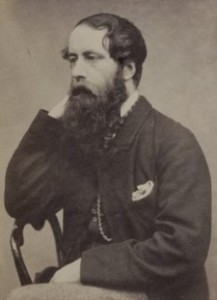
Arthur Munby
(1828-1910)
Post Mortem
I lay in my coffin under the sod;
But the rooks they caw’d, and the sheep they trod
And munch’d and bleated, and made such a noise–
What with the feet of the charity boys
Trampling over the old grave-stones–
That it loosen’d my inarticulate bones,
And chased my sleep away.
So I turn’d (for the coffin is not so full
As it was, you know) my aching skull;
And said to my wife–and it’s not my fault
If she does lie next to me in the vault–
Said to her kindly, “My love, my dear,
How do you like these sounds we hear
Over our heads to-day?”
My wife had always a good strong voice;
But I’m not so sure that I did rejoice
When I found it as strong as it used to be,
And so unexpectedly close to me:
I thought, if her temper should set in,
Why, the boards between us are very thin,
And whenever the bearers come one by one
To deposit the corpse of my eldest son,
Who is spending the earnings of his papa
With such sumptuous ease and such great eclat,
They may think it more pleasant, perhaps, than I did,
To find that in death we were not divided.
However, I trusted to time and the worms;
And I kept myself to the mildest terms
Of a conjugal “How d’ye do.”
“John,” said my wife, “you’re a Body, like me;
At least if you ain’t, why you ought to be;
And I really don’t think, when I reflect,
That I ought to pay as much respect
To a rattling prattling skeleton
As I did to a man of sixteen stone.
However” (says she), “I shall just remark
That this here place is so cool and dark,
I’m certain sure, if you hadn’t have spoke,
My slumber’d never have thus been broke;
So I wish you’d keep your–voice in your head;
For I don’t see the good of being dead,
If one mayn’t be quiet too.”
She spoke so clear and she spoke so loud,
I thank’d my stars that a linen shroud
And a pair of boards (though they were but thin)
Kept out some part of that well-known din:
And, talking of shrouds, the very next word
That my empty echoing orbits heard
Was, “Gracious me, I can tell by the feel
That I’m all over rags from head to heel!
Here’s jobs for needle and thread without ending,
For there’s ever-so-many holes wants mending!”
“My love,” I ventured to say, “I fear
It’s not much use, your mending ’em here;
For, as fast as you do, there’s worse than moth,
And worse than mice, or rats, or both,
Will eat up the work of your cotton ball
And leave you never a shroud at all–
No more than they have to me.”
Now, whether it was that she took it ill
My seeking to question her feminine skill,
Or whether ’twas simply that we were wedded–
The very thing happen’d that I most dreaded:
For, by way of reply, on the coffin-side,
Just where the planks had started wide,
There came a blow so straight and true
That it shook my vertebral column in two;
And what more might have follow’d I cannot tell,
But that very minute (’twas just as well)
The flagstone was lifted overhead,
And the red-nosed buriers of the dead
Let down a load on my coffin-plate
That stunned me quite with the shock of its weight.
‘Twas the corpse, of course, of my eldest son,
Who had injured his brain (a little one)
By many a spirituous brain-dissolver,
And finish’d it off with a Colt’s revolver.
Well–when they had gone and the noise had ceased,
I look’d for one other attack, at least:
But, would you believe it? The place was quiet,
And the worms resumed their usual diet!
Nay, everything else was silent too;
The rooks they neither caw’d nor flew,
And the sheep slept sound by footstone and head,
And the charity boys had been whipp’d to bed.
So I turn’d again, and I said to myself–
“Now, as sure as I’m laid on this sordid shelf
Away from the living that smile or weep,
I’ll sleep if I can, and let her too sleep:
And I will not once, for pleasure or pain,
Unhinge my jaws to speak again,
No, not if she speaks to me.”
Arthur Munby poetry
fleursdumal.nl magazine
More in: Archive M-N, Arthur Munby & Hannah Cullwick, CLASSIC POETRY, Munby & Cullwick
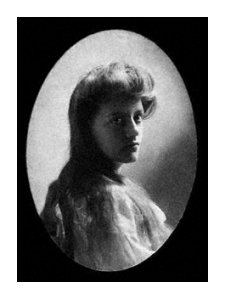
Aline (Murray) Kilmer
(1888-1941)
Things
Sometimes when I am at tea with you
I catch my breath
At a thought that is old as the world is old
And more bitter than death.
It is that the spoon that you just laid down
And the cup that you hold
May be here shining and insolent
When you are still and cold.
Your careless note that I laid away
May leap to my eyes like flame
When the world has almost forgotten your voice
Or the sound of your name.
The golden Virgin da Vinci drew
May smile on over my head,
And daffodils nod in the silver vase
When you are dead.
So let moth and dust corrupt and thieves
Break through and I shall be glad,
Because of the hatred I bear to things
Instead of the love I had.
For life seems only a shuddering breath,
A smothered, desperate cry,
And things have a terrible permanence
When people die.
Aline Kilmer poetry
fleursdumal.nl magazine
More in: Archive M-N, CLASSIC POETRY

Don[ald Robert Perry] Marquis
(1878-1937)
“They Had No Poet . . .”
“Vain was the chief’s, the sage’s pride!
They had no poet and they died.” — POPE.
BY TIGRIS, or the streams of Ind,
Ere Colchis rose, or Babylon,
Forgotten empires dreamed and sinned,
Setting tall towns against the dawn,
Which, when the proud Sun smote upon,
Flashed fire for fire and pride for pride;
Their names were . . . Ask oblivion! . .
“They had no poet, and they died.”
Queens, dusk of hair and tawny-skinned,
That loll where fellow leopards fawn . . .
Their hearts are dust before the wind,
Their loves, that shook the world, are wan!
Passion is mighty . . . but, anon,
Strong Death has Romance for his bride;
Their legends . . . Ask oblivion! . . .
“They had no poet, and they died.”
Heroes, the braggart trumps that dinned
Their futile triumphs, monarch, pawn,
Wild tribesmen, kingdoms disciplined,
Passed like a whirlwind and were gone;
They built with bronze and gold and brawn,
The inner Vision still denied;
Their conquests . . . Ask oblivion! . . .
“They had no poet, and they died.”
Dumb oracles, and priests withdrawn,
Was it but flesh they deified?
Their gods were . . . Ask oblivion! . . .
“They had no poet, and they died.”
Don Marquis poetry
fleursdumal.nl magazine
More in: Archive M-N, CLASSIC POETRY

Aline (Murray) Kilmer
(1888-1941)
If I Had loved You More
If I had loved you more God would have had pity;
He would never have left me here in this desolate place,
Left me to go on my knees to the door of Heaven
Crying in vain for a little sight of your face.
How could I know that the earth would be dark without you?
For you were always the lover and I the friend.
Now if there were any hope that I might find you
I would go seeking you to the world’s end.
“God is a jealous God. You have loved too wildly,
You have loved too well!” one said.
I bowed my head, but my heart in scorn was crying
That you whom I had not loved enough are dead.
I look on my heart and see it is hard and narrow,
That my loves are slight and last but a little space.
But why do I go on my knees to the door of Heaven
Crying for only a little sight of your face?
Aline Kilmer poetry
fleursdumal.nl magazine
More in: Archive M-N, CLASSIC POETRY
Thank you for reading Fleurs du Mal - magazine for art & literature